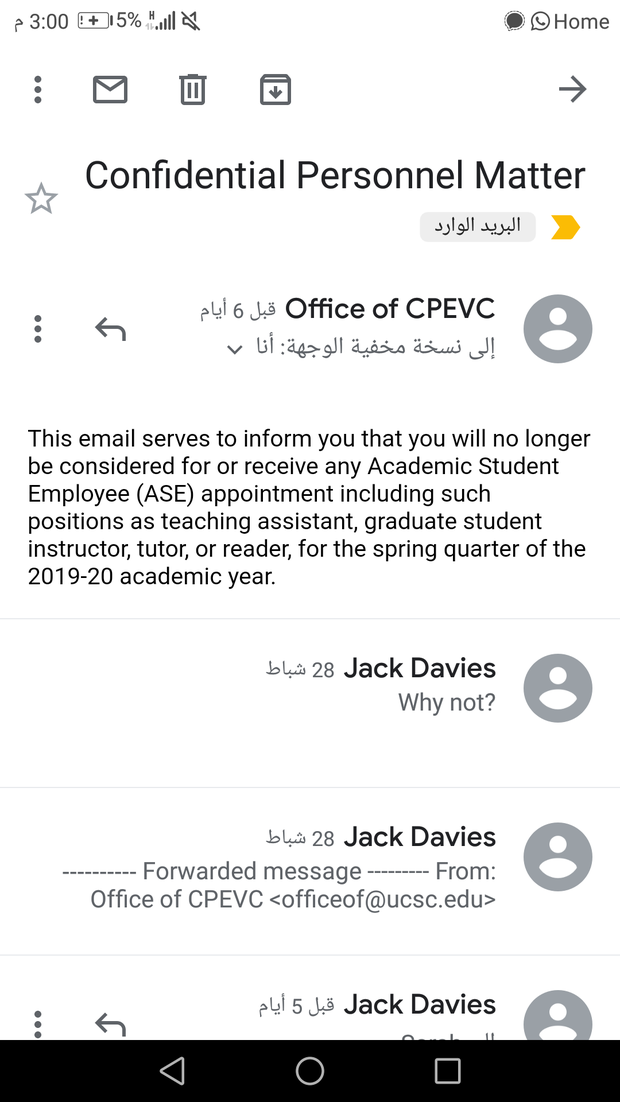On February 28, 54 graduate students were fired from their teaching assistant positions at the University of California Santa Cruz after striking for higher wages, and 28 more were told they wouldn’t be rehired when the next quarter starts at the end of March.
Many of those dismissed by the university are parents, expecting parents, and international students — and now, they say they’re struggling even more to cover basic living expenses.
Jack Davies, a Ph.D. student in the humanities division’s history of consciousness program, told CBS News he came to the United States from Australia to attend the University of California Santa Cruz. He said he’s spent the majority of his first two-and-a-half years of his six-year program as a teaching assistant (TA).
Trending News ›
At 4:50 p.m. on February 28, he said he received a single-sentence email from the Executive Vice Chancellor’s Office telling him he will no longer be considered for the only job he is eligible for as an international graduate student.
“The email serves to inform you that you will no longer be considered for or receive any Academic Student Employee (ASE) appointment including such positions as teaching assistant, graduate student instructor, tutor, or reader, for the spring quarter of the 2019-2020 academic year,” the email said.
He is now looking to move homes for the fourth time since starting at UC — but even before he was fired, he said, his financial situation was precarious.
The 29-year-old made roughly $2,000 a month after taxes, about $600 of which went toward renting a shared room in a house with four other people. He is considered “rent-burdened” by the U.S. Department of Housing and Urban Development’s guidelines.
Despite skipping meals and sharing housing, he said he was only getting further into debt. UC’s stipend is his only income, and he cannot get a U.S. credit card or loan because of his lack of credit history in the U.S. His only credit card, he said, is based in Australia, and it has a high interest rate and a “poor” conversion rate.
“We should not be having to debt finance our rent. Taking out a loan means taking on debt simply to have a roof over our heads. And at least for me, maybe it’s just because I come from another country, that seems kind of unacceptable,” he said. “This is a really sort of perverse situation that doesn’t exist in other countries and is something worth fighting against.”
According to the UC Santa Cruz TA Handbook, teaching assistants are the “primary point of contact for hundreds of students.” TAs are expected to facilitate lab or discussion sections, grade papers and exams, hold office hours, attend lectures, present guest lectures, and/or draft exams, according to the handbook — all within 20 hours a week. Despite the cap on hours, students told CBS News that they often work longer.
According to UAW 2865, the union representing Davies and other graduate students, Academic Student Employees have an average salary of $21,000 a year. Every ASE student across all UC campuses is considered rent-burdened, according to the union.
Assistant professors, as listed on UCSC’s website, make at least $66,100 a year, and professors can make up to $175,800 a year. Deans can make up to $696,000 a year.
Despite working anywhere from 20 to more than 40 hours a week, there are dozens of accounts of graduate students at being homeless, relying on local food pantries, and avoiding needed medical care. Many of these accounts have been posted on a website created by striking students.
Those conditions prompted hundreds of students to demand a cost of living adjustment, or COLA. The COLA 4 All movement began at UC Santa Cruz in November, and since December, participating graduate students have picketed on campus grounds and withheld fall 2019 grades of the students in their classes.
UAW 2865 has demanded a cost of living adjustment of $2,285. The students at Santa Cruz who organized the “wildcat strikes” — labor stoppages not authorized by union leadership — are demanding less, just $1,412.
Those labor stoppages prompted the firings.
“It is extremely disappointing to us that we have to take such a drastic step, but we ultimately cannot retain graduate students as employees who will not fulfill their responsibilities,” said Scott Hernandez-Jason, director of news and media relations at UC Santa Cruz. “While we have been able to successfully get 96 percent of grades submitted for the fall quarter, we cannot jeopardize our undergraduates’ education or put them in a position where they may not have the teaching resources they need to succeed throughout the spring semester.”
On their website, the striking students have said that they will not withhold grades in situations that require their “urgent release.” The Office of the Registrar, according to the students, will allow individual grades to be submitted on a case-by-case basis.
“As educators, our commitment is always to fight for our students and for stronger support for undergraduate education,” they wrote. “In the mid- to long-term, however, students are much better served when the professional workers handling their education at UC can focus on their work rather than on houselessness, food insecurity and transportation precarity.”
Some faculty members, have said they will also withhold grades and support the strike, according to the students.
Hernandez-Jason said international graduate students who cannot work as teaching assistants can continue their studies, and must maintain full-time enrollment as a requirement for their visa.
Under federal regulations, students with an F1 visa are not allowed to work off campus. They are only allowed to work on campus up to 20 hours a week, no more than 50% of the time. They must also be able to support themselves financially. If they do not comply with these guidelines, they risk losing their legal status.
Manasvin Rajagopalan faces similar issues at UC Davis, where he is a third-year Ph.D. student in comparative literature. Originally from India, the 26-year-old also has an F1 visa, and said there are few financial options for international students. Most fellowships, he said, are limited to American residents or citizens, “making it impossible for us to survive without teaching jobs.”
“The lack of funding opportunities and the severe risks with employment loss make it difficult to manage within the system and leads to severe consequences for us,” he said, “especially if we’re from countries with a more unfavorable exchange rate.”
Rajagopalan is taking part in UC Davis’ grading strike and is worried that the campus may follow Santa Cruz’s lead in firing students. He said he is being cautious with his participation, and if the pressure is enough to threaten his visa status, he “might have to reconsider.”
He’s also looking at contingency plans, such as applying to other universities in the U.S. and the United Kingdom. But if he did need to switch schools, he risks having to start his degree program over and has to find a way to finance the move.
“[It] might force me to think about whether I can afford to be in academia at all, which is awful because I truly love what I do,” he said. “My work both in research, and with my students.”
For some grad students, getting a cost of living adjustment is more than being able to cover the rent — it’s being able to purchase food their children. Davies said at least two parents have been fired from Santa Cruz for striking, as well as three people who are expecting a child.
Brenda Arjona, a single mom and third-year Ph.D. student studying anthropology, was fired on February 28 in an email saying that effective March 26, it is the university’s “intent to dismiss you from your position of Teaching Assistant in Anthropology.” She lives with her 10-year-old son in family housing on campus, which even at $1,400 a month for a two bedroom apartment, eats up more than half of her monthly income.
“I feel degraded,” she said. “It feels like a slap in the face to have come this far and have the two degrees that I have and to still be struggling like this. … I shouldn’t be in this situation.”
Arjona, 33, has been striking since December. She made about $2,200 a month to support her and her son — just $200 more than Davies. In the fall, she couldn’t afford to pay her electric bill.
“I was severely depressed. … It’s hard not to have mental health issues when you’re having such a hard time making ends meet and you’re trying to get a career and you’re trying to raise a child. I was at my breaking point,” she said. “The school has this one-size-fits-all mold … I’m a single mom and I have to take care of a kid and don’t have a partner to help.”
The school has said it will provide an annual $2,500 housing supplement until more campus housing is available. But that’s just $208 a month, and Arjona explained that is hardly enough to cover food, rent, bills, and child care.
All of the dismissed students who spoke to CBS News are hopeful that the school will come to an agreement with the union and that they will be rehired.
Arjona said that if she is rehired, getting a cost of living adjustment would mean being able to provide the basic needs for her and her son while she works toward a career that will be beneficial for both of them in the long-term.
“I don’t want a lavish life, I just want to be able to pay the basic needs. I want to be able to buy toilet paper,” she said. “We’re just trying to be in a position where we can pay for those things that are absolutely necessary, and study.”
For now, Arjona, Davies, and dozens of other UC Santa Cruz students are planning to continue striking.
“This should be completely unacceptable, should be considered deplorable and intolerable,” said Davies. “We’re talking about livelihoods and families and careers that have just been so easily and callously imperiled.”




